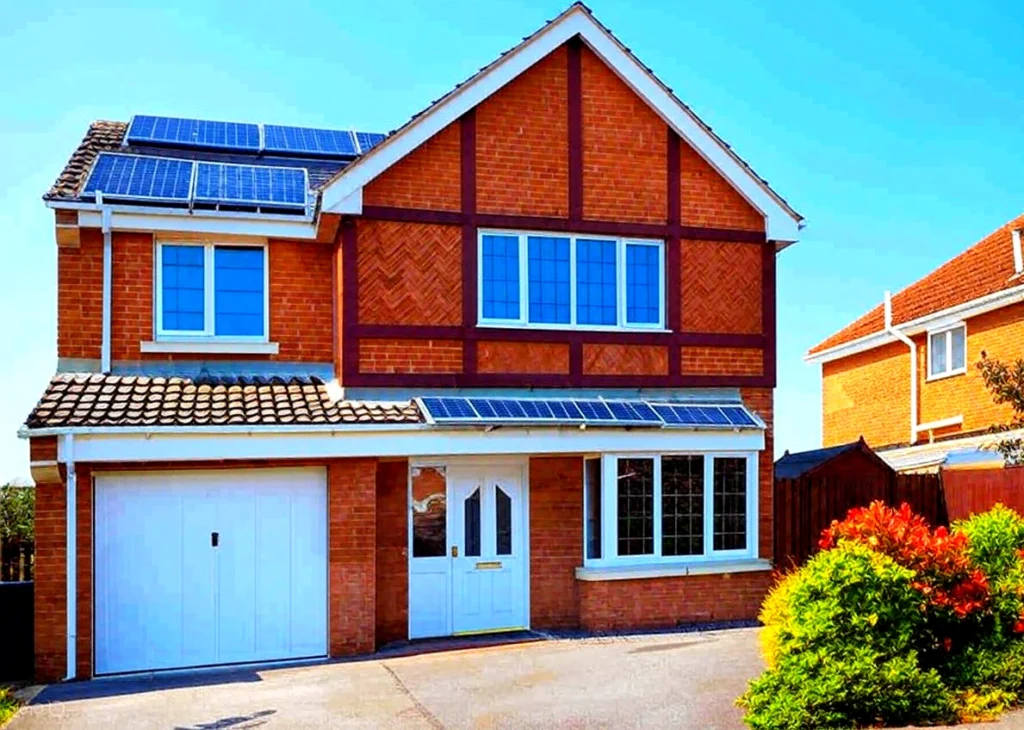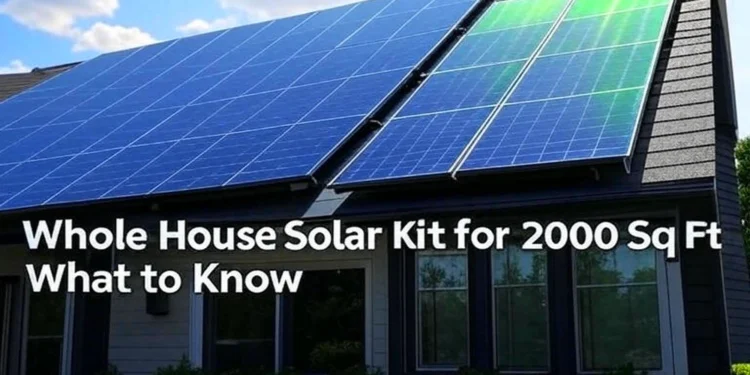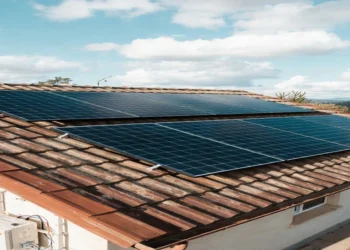I’ve installed whole house solar kits for hundreds of 2000 sq ft homes. Here’s exactly what size system you need, real costs, and which kits actually work.
Last month, a homeowner called me frustrated. He’d bought a “whole house solar kit” online for his 2000 sq ft home, spent $15,000, and it barely powered his refrigerator.
The problem? Most “whole house” solar kits aren’t designed for actual whole houses.
I’ve been installing complete solar systems for 2000 sq ft homes since 2012. Today, I’m going to tell you exactly what you really need, what it costs, and which solar kits actually work for powering an entire home.
What Does “Whole House Solar Kit” Actually Mean?
Here’s the truth – there’s no standard definition for a “whole house” solar kit.
Some companies call a 3kW system “whole house” because it technically connects to your house. Others sell 10kW+ systems that can actually power everything you own.
For a typical 2000 sq ft home, you’re looking at needing 6-10kW of solar power, depending on your energy usage. That’s 20-35 solar panels in most cases.
How Much Power Does a 2000 Sq Ft Home Really Use?
After installing solar on hundreds of 2000 sq ft homes, here’s what I typically see:
Average 2000 sq ft home energy usage:
- Summer (with AC): 1,200-1,800 kWh per month
- Winter (with heating): 900-1,400 kWh per month
- Spring/Fall: 700-1,200 kWh per month
That translates to needing:
- 7-12kW solar system for full energy independence
- 6-8kW system to cover 70-80% of your usage
- 4-6kW system for basic coverage (lights, outlets, some appliances)
I had one customer with a 2000 sq ft home using 2,200 kWh per month. Turned out they had an old AC unit and electric heating. We installed a 12kW system and cut their electric bill to zero.
Real Whole House Solar Kit Options for 2000 Sq Ft Homes
Budget Option: 6kW Complete Solar Kit ($8,000-12,000)
What you get:
- 18-20 solar panels (300-350W each)
- String inverter or power optimizers
- Mounting hardware
- Basic monitoring
- Wiring and safety equipment
What it powers in a 2000 sq ft home:
- All lighting and outlets
- Refrigerator and kitchen appliances
- TV and electronics
- About 60-70% of total usage (you’ll still have an electric bill)
Best for: Homes with gas heating and efficient appliances
Mid-Range Option: 8kW Complete Solar Kit ($12,000-18,000)
What you get:
- 24-26 solar panels (300-350W each)
- Microinverters or power optimizers
- Premium mounting system
- Advanced monitoring
- Battery-ready setup
What it powers in a 2000 sq ft home:
- Everything in the budget kit PLUS
- Window AC units or small central AC
- Electric water heater (depending on size)
- About 80-90% of total usage
Best for: Most 2000 sq ft homes with mixed gas/electric appliances
Premium Option: 10-12kW Complete Solar Kit ($18,000-28,000)
What you get:
- 30-36 high-efficiency solar panels
- Microinverters with 25-year warranty
- Premium mounting and monitoring
- Battery backup option
- Professional design software
What it powers in a 2000 sq ft home:
- 100% of typical usage
- Large central AC system
- Electric heating (heat pump)
- Electric vehicle charging
- Future expansion room
Best for: All-electric 2000 sq ft homes or heavy energy users
Complete Solar Kit Components Breakdown
| Component | Budget Kit | Mid-Range Kit | Premium Kit |
|---|---|---|---|
| Solar Panels | 18-20 panels (300W) | 24-26 panels (320W) | 30-36 panels (350W+) |
| Inverter Type | String inverter | Power optimizers | Microinverters |
| Warranty | 10-15 years | 20 years | 25 years |
| Monitoring | Basic system level | Panel level monitoring | Advanced analytics |
| Installation | DIY or basic install | Professional recommended | Professional required |
Sizing Your Whole House Solar Kit: My Simple Method
Step 1: Check Your Electric Bills Look at 12 months of usage. Add them up and divide by 12 for your average monthly kWh.
Step 2: Use My Rule of Thumb
- 1,000 kWh/month = 6-7kW solar system
- 1,200 kWh/month = 7-8kW solar system
- 1,500 kWh/month = 9-10kW solar system
- 1,800 kWh/month = 11-12kW solar system
Step 3: Add 20% Buffer Solar production varies by season. I always recommend sizing up slightly.
Real example: Customer with 2000 sq ft home used 1,400 kWh average. I recommended an 8.5kW system (1,400 ÷ 165 = 8.5kW). It covers 95% of their annual usage.
What’s NOT Included in Most Solar Kits
Permitting and Inspections ($500-1,500)
- Building permits
- Electrical permits
- Utility interconnection
- City/county inspections
Professional Installation ($3,000-8,000)
- Labor for mounting and wiring
- Electrical panel upgrades (if needed)
- Roof work or repairs
- System commissioning
Additional Equipment You Might Need:
- Electrical panel upgrade ($1,500-3,000)
- Roof reinforcement ($500-2,000)
- Trenching for ground mount ($1,000-3,000)
- Battery backup system ($8,000-15,000)
DIY vs Professional Installation for 2000 Sq Ft Homes
DIY Installation (If You’re Handy)
Pros:
- Save $3,000-8,000 in labor costs
- Learn how your system works
- Work at your own pace
Cons:
- Void some warranties
- Permitting complications
- Safety risks
- No professional guarantees
Best for: Experienced DIY’ers with simple roof layouts
Professional Installation (What I Recommend)
Pros:
- Full warranties and guarantees
- Proper permitting and inspections
- Professional system design
- Insurance coverage
Cons:
- Higher upfront cost
- Less control over timeline
- Dependence on installer quality
Best for: Most homeowners especially with complex roofs.

Real Customer Examples: 2000 Sq Ft Homes
The Energy-Efficient Family:
- 2000 sq ft home, gas heating, efficient appliances
- Average usage: 900 kWh/month
- Solar kit: 6.5kW system (22 panels)
- Result: Zero electric bills year-round
The All-Electric Home:
- 2000 sq ft home, heat pump, electric water heater
- Average usage: 1,600 kWh/month
- Solar kit: 10kW system (32 panels)
- Result: 98% energy independence
The Work-From-Home Setup:
- 2000 sq ft home office, multiple computers, AC running all day
- Average usage: 1,900 kWh/month
- Solar kit: 12kW system with battery backup
- Result: Complete energy independence plus backup power
Hidden Costs to Watch For
Roof Issues ($500-5,000)
- Old shingles that need replacement
- Structural reinforcement
- Skylights or obstacles
Electrical Upgrades ($800-3,000)
- Panel upgrades from 100A to 200A
- New meter base
- Grounding improvements
Utility Fees ($100-500)
- Net metering application
- New meter installation
- Interconnection studies
Ongoing Costs:
- Annual system cleaning ($200-400)
- Monitoring service ($100-300/year)
- Insurance increase ($50-200/year)
Questions to Ask Solar Kit Companies
About the System:
- What’s the total kW rating?
- How many kWh will it produce annually in my area?
- What percentage of my usage will it cover?
About Components:
- What’s the panel efficiency and warranty?
- What type of inverter is included?
- Is monitoring included?
About Support:
- Do you help with permitting?
- Is installation available?
- What’s the warranty coverage?
Red flags to avoid:
- “One size fits all” solar kits
- No mention of local solar production
- Unrealistic savings claims
- No warranty information
Frequently Asked Questions About Whole House Solar Kits
Q: Can a solar kit really power my entire 2000 sq ft home?
A: Yes, but you need the right size. Most homes need 8-12kW, not the 3-5kW systems many companies call “whole house” kits.
Q: How do I know exactly what size solar system I need?
A: Check out our detailed guide on sizing your solar system here: What Size Solar System Do I Need for a 2000 Sq Ft Home?
2000 sq ft home?
A: 6-10 years typically, depending on your local electricity rates and incentives. Higher usage homes pay back faster.
Q: Do I need batteries with my whole house solar kit?
A: Not required, but recommended for backup power. Grid-tie systems without batteries still eliminate most electric bills.
Bottom Line: Choosing the Right Whole House Solar Kit
For most 2000 sq ft homes, you’ll need an 8-10kW solar system to truly power your whole house. That’s 26-32 panels in most cases.
Don’t get fooled by “whole house” marketing on undersized systems. Look at your actual energy usage and size the system accordingly.
My recommendation for most 2000 sq ft homes: Start with an 8kW kit with room to expand. It’ll cover 80-90% of typical usage and you can add more panels later if needed.
Remember – the best solar kit is one that’s properly sized for YOUR home’s energy usage, not a generic “whole house” package.
Got questions about sizing a solar kit for your specific 2000 sq ft home? Drop your monthly kWh usage in the comments and I’ll give you my recommendations.
Solar power should give you energy independence and lower bills, not leave you wondering why your “whole house” kit only powers half your house.











